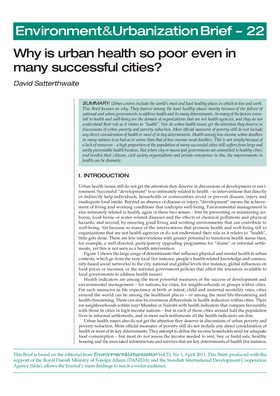Why is urban health so poor even in many successful cities?

This Brief is based on the editorial from Environment and Urbanization Vol 23, No 1, April 2011.
Urban centres include the world's most and least healthy places in which to live and work. This Brief focuses on why. They feature among the least healthy places mostly because of the failure of national and urban governments to address health and its many determinants. So many of the factors essential to health and well-being are the domain of organizations that are not health agencies, and they do not understand their role as it relates to “health”. Nor do urban health issues get the attention they deserve in discussions of urban poverty and poverty reduction. Most official measures of poverty still do not include any direct consideration of health or most of its key determinants. Health among low-income urban dwellers in many nations is as bad as or worse than that of low-income rural dwellers. This is not simply because of a lack of resources – a high proportion of the population of many successful cities still suffers from large and easily preventable health burdens. But where city or municipal governments are committed to healthy cities, and involve their citizens, civil society organizations and private enterprises in this , the improvements in health can be dramatic.
Cite this publication
Available at https://www.iied.org/10595iied